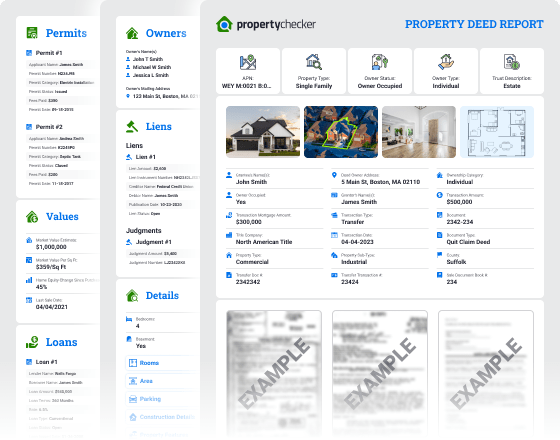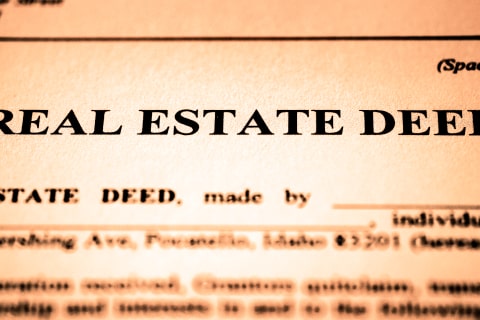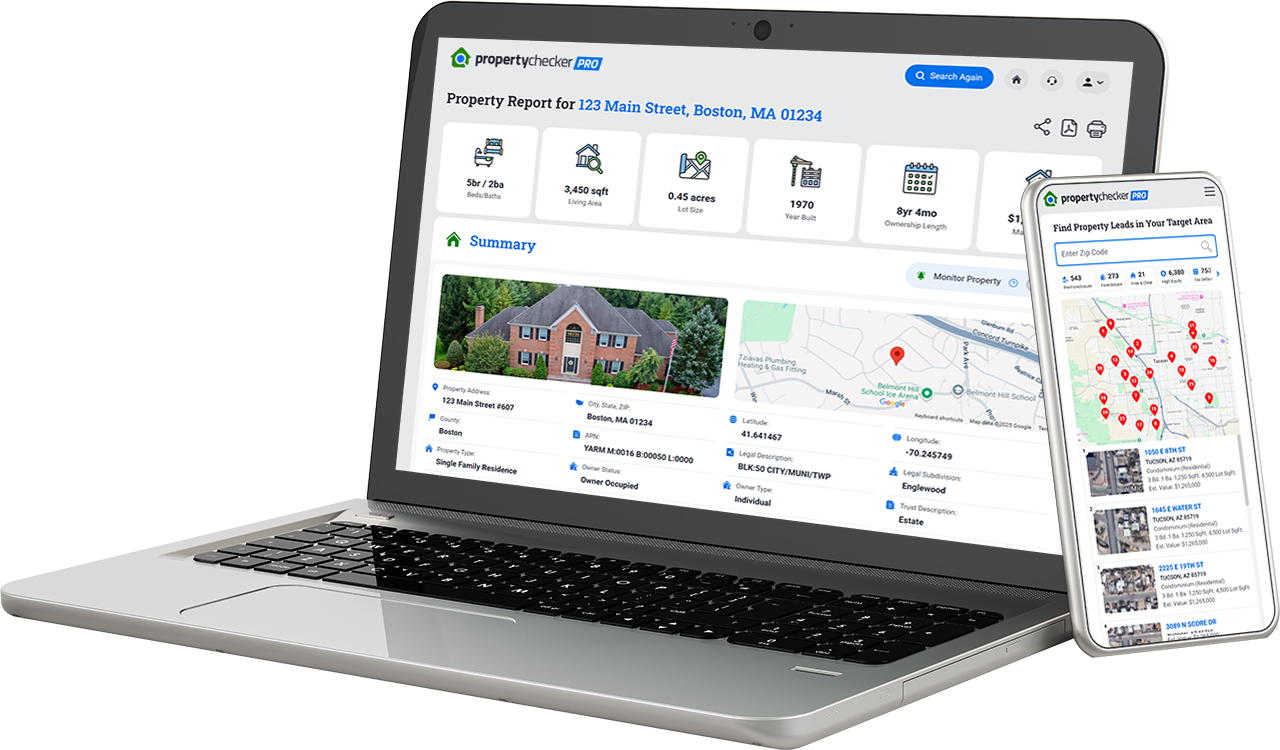Power of Property Data Under Your Fingertips

Deeds & Liens
- Property Deeds
- Property Liens
- Foreclosures
- Much More!

Purchase History
- Sales History
- Past Sale Prices
- Sale Dates
- Transfer Types
- Much More!

Owner Information
- Names
- Addresses
- Phone Numbers
- Emails
- Much More!

Property Values
- Sales History
- Market Value
- Equity
- Much More!

Mortgage Records
- Lenders
- Mortgage Amount
- Second Mortgage
- Much More!

Property Taxes
- Tax Bill Amount
- Assessed Value
- Tax Delinquency
- Much More!

Property Details
- Property Features
- Building Permits
- Parcel Info
- Much More!

Building Permits
- Dates
- Permit Types
- Business Type
- Fees, Status
- Much More!
PropertyChecker is the most affordable and efficient way to find local and nationwide property records.
Our database covers over 158 million properties in over 3,000 counties and is updated daily.
How to Access Deed Information Using PropertyChecker

PropertyChecker offers a handy search tool to find deeds. You can enter the property address, owner’s name, or phone number to locate deeds and other records pertaining to your criteria. You will see the available information within seconds once you click the “Search” button. If you have one, you can also search by parcel number and owner email.
A deed can provide vast information about a buyer, the property, and warranty information. Some of the valuable data points you can uncover with PropertyChecker include:
- Type of Deed
- Seller Information
- Buyer Information
- Liens
- Terms of the Sale
- Legal Property Description
- Boundaries / Map Coordinates
- And Much More!
Why Use PropertyChecker?
Professionals like realtors, title companies, attorneys, tax professionals, CPAs, lenders, home inspectors, appraisers, and even creditors occasionally need to look up deeds for property ownership. Some of the best reasons to use PropertyChecker data are:
- Establish Ownership
- Title Research
- Historical Research
- Resolving Boundary Disputes
- Tax Assessment
PropertyChecker saves you time and money by gathering all the information you need in one place. You don’t have to waste your day visiting courthouses or town records offices to get copies of deeds; you can access real-time property records instantly with PropertyChecker. We source all our data from reputable public, private, and government sources.

Deeds are invaluable documents that prove legal property ownership and title. They differ widely from state to state, and many different kinds of deeds exist depending on the location and property transfer situation. Some provide a warranty against title defects, and others do not.
These essential documents provide a wide variety of information and are public records available to anyone who searches for them. The key is learning how to find the deed to property that is appropriate for your purposes.
Understanding the Difference Between Property Titles and Deeds
A deed is a physical, legal document proving property ownership. Title is a concept that gives someone the legal right to access a property. Although intangible, it is a powerful element that affects real estate transactions and home ownership. Think of the deed as a receipt for buying a piece of real estate. The title is transferred with the deed, and it’s your legal right to access and use the property, but there is no document associated with the title.
Title issues can cause serious problems for buyers, owners, real estate professionals, and title companies. Lenders require buyers to purchase title insurance to protect against such issues. Title companies perform thorough searches to look for any title issues, such as a long-lost relative who claims to hold title to the property, which could complicate the sale.
How to Search Property Deeds by Address, Name or Number?
Deeds contain a wealth of information like the grantor’s (seller) and grantee’s (buyer) names and addresses. They also contain details about the transferred property (address, map coordinates, plats, surveys, encumbrances, etc.). Deeds also include the lien type, warranty, conveyance details, and legal jargon. You may have dozens of reasons why you need to find out who owns a particular property. Deeds are a surefire way to find out.
You can find a deed to a property easily using one of the methods listed below.
County Clerk, Registry of Deeds, or Recorder’s Office
Each U.S. county has an office that maintains deeds. When transferring real estate, you must record a new deed with the county clerk, registry of deeds, or recorder’s office. These are public records; you can search for a property deed for free on the county website or visit the office in person to request a copy. They will charge you a small fee for a copy.
Title Companies & Deed Repositories
You can also check with a local title company or check online deed repositories. Verify that you have the latest deed and the most current owner of the property. These services may charge you for a copy or to find necessary records.
Frequently Asked Questions
How to get a copy of a property deed online?
You can use municipal or commercial sources to search for and download copies of property deeds online. Some even allow you to get a copy of property deeds online for free. Others may charge a small fee.
How to get the title deed of property?
You can get a copy by visiting the county registry of deeds, recorder’s office, or county clerk where the deed was filed. You will have to pay a small fee for a certified paper copy.
Where to get property deeds?
You can perform a property deed search by name online or visit any local government office where deeds are recorded, maintained, stored, and issued upon request.
What is a tax deed property?
A tax deed property is one that the local government owns because of a tax lien. The government seized the home from the homeowner because of unpaid property taxes. Typically, the government agency will sell the house at a public auction.
Can you sell a tax deed property?
Only if you are the tax deed owner, meaning the government office or state that seized the property. You can sell the property or the tax lien through an auction, wholesale realty market, or regular real estate channels. If you “were” the homeowner, you can no longer sell the property because you don’t own it anymore.
Access Every Feature You Need to Find, Analyze, and Invest in Properties










Find Investment Properties with 15+ Targeted Lead Lists
Gain access to 160+ million properties nationwide, backed by 248+ million mortgage and loan records and 300+ million building permits — all in one powerful platform.
Foreclosures
Pre-Foreclosures
Free & Clear
High Equity
Tax Default
Vacant Lots
Intra-Family Transfers
Out-of-State Owners
Not-a-Principal Residence
Recently Sold
Flipped Properties
Failed Listings

State Property Records
- Alabama
- Alaska
- Arizona
- Arkansas
- California
- Colorado
- Connecticut
- Delaware
- Florida
- Georgia
- Hawaii
- Idaho
- Illinois
- Indiana
- Iowa
- Kansas
- Kentucky
- Louisiana
- Maine
- Maryland
- Massachusetts
- Michigan
- Minnesota
- Mississippi
- Missouri
- Montana
- Nebraska
- Nevada
- New Hampshire
- New Jersey
- New Mexico
- New York
- North Carolina
- North Dakota
- Ohio
- Oklahoma
- Oregon
- Pennsylvania
- Rhode Island
- South Carolina
- South Dakota
- Tennessee
- Texas
- Utah
- Vermont
- Virginia
- Washington
- Washington D.C.
- West Virginia
- Wisconsin
- Wyoming







 Foreclosures
Foreclosures Pre-Foreclosures
Pre-Foreclosures Free & Clear
Free & Clear High Equity
High Equity Tax Default
Tax Default Vacant Lots
Vacant Lots Intra-Family Transfers
Intra-Family Transfers Out-of-State Owners
Out-of-State Owners Not-a-Principal Residence
Not-a-Principal Residence Recently Sold
Recently Sold Flipped Properties
Flipped Properties Failed Listings
Failed Listings